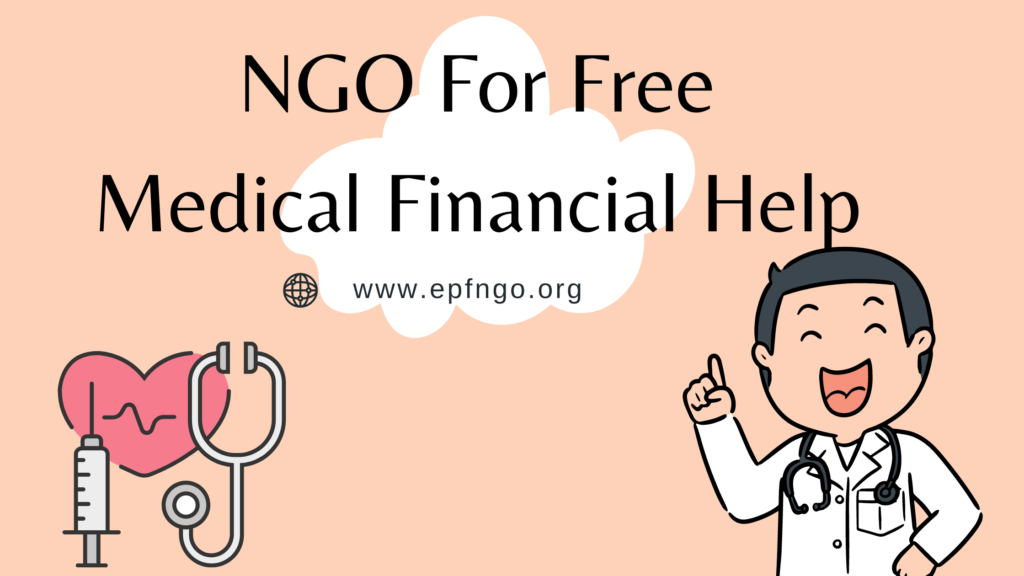- September 24, 2024
- epfngo
- 0 Comments
- Uncategorized
NGO for Medical Help
When people face medical emergencies or require long-term treatments, the costs can be overwhelming, especially for low-income families or individuals without insurance coverage. This is where NGOs (Non-Governmental Organizations) step in to bridge the gap between essential healthcare needs and financial limitations. NGOs focused on medical financial help ensure that everyone, regardless of their financial situation, can access the treatments and medications they need.
Why Seek Medical Help from NGOs?
In India, medical care is often costly, making it out of reach for many people. While government schemes like Ayushman Bharat have made strides in offering subsidized healthcare, gaps still exist. In many situations, treatment costs for serious illnesses, surgeries, or long-term care can far exceed what is covered by these schemes.
NGOs offer an alternative, providing financial help for healthcare and often stepping in when government resources fall short. They focus on:
- Emergency care: NGOs provide financial assistance for urgent surgeries or treatments that can be lifesaving.
- Support for chronic illnesses: Many NGOs offer help with ongoing medical expenses for long-term diseases like cancer, diabetes, and kidney failure.
- Free medical camps and clinics: Some organizations conduct regular health camps, offering free consultations, basic medicines, and preventive care in underserved areas.

How NGOs Provide Medical Financial Assistance
- Direct Financial Aid: Many NGOs, like the Ek Parivartan Foundation, provide direct financial assistance to cover the costs of surgeries, hospitalizations, and treatments for critical conditions. This can include partial or full payment for medical bills, depending on the severity of the case and the NGO’s resources.
- Medical Camps and Clinics: In addition to financial aid, NGOs organize free medical camps where people can get access to doctors and medical care. These camps are typically held in rural or underserved areas, where healthcare facilities are either scarce or unaffordable.
- Medical Equipment Donations: Some NGOs donate medical equipment like wheelchairs, hearing aids, and prosthetics to those in need, reducing the financial burden on families.
- Collaborations with Hospitals: NGOs often have partnerships with local hospitals to offer subsidized treatment to the underprivileged. Hospitals may allocate a number of beds or free surgeries specifically for NGO-supported patients.
How to Approach an NGO for Medical Help
If you or someone you know requires financial help for medical treatment, here’s how you can reach out:
- Research Local NGOs: Start by identifying organizations that focus on healthcare support. Ek Parivartan Foundation, for instance, specializes in providing medical financial aid and organizes health camps across various regions.
- Visit NGO Websites: Most NGOs have detailed information about the kind of medical help they offer on their websites. They often outline the eligibility criteria and the application process for financial assistance.
- Prepare Documentation: When applying for medical financial help, it’s important to gather all necessary documentation. This typically includes medical reports, doctor’s prescriptions, a breakdown of treatment costs, and proof of income or financial hardship.
- Seek Recommendations: You can also ask local hospitals or clinics if they work with any NGOs that offer medical financial assistance. Many hospitals have relationships with organizations that sponsor surgeries or treatments for low-income patients.
Impact of NGOs on Healthcare Access
NGOs play a crucial role in improving healthcare access for millions of people. They fill the gaps left by an overburdened public healthcare system and provide hope to those who would otherwise struggle to get timely and adequate care. For instance:
- Emergency Support: Immediate assistance during emergencies like accidents, heart attacks, or surgeries can mean the difference between life and death. NGOs that provide emergency medical aid ensure that treatment isn’t delayed due to financial constraints.
- Long-Term Care: For chronic conditions, such as cancer treatments or dialysis, ongoing financial support can prevent families from going into debt or, worse, having to choose between healthcare and daily living expenses.
Top NGOs Providing Medical Financial Help
- Ek Parivartan Foundation: This NGO offers comprehensive medical financial support, including funding for surgeries, treatments, and medication for those in need. They also hold medical camps in underserved regions. Visit Website.
- Smile Foundation: Known for its healthcare initiatives, Smile Foundation provides medical aid to underprivileged children and mothers across India.
- Ocean Welfare Foundation: This NGO runs medical clinics and offers financial assistance to critically ill patients, especially children from poor families.
To qualify for medical financial assistance from an NGO, you typically need to provide proof of financial hardship and medical documentation, such as diagnosis reports, doctor’s prescriptions, and a treatment cost breakdown. Different NGOs have specific eligibility criteria, so it’s important to check with the NGO directly. Some organizations prioritize low-income families, critical illness cases, or emergency treatments.
The extent of coverage depends on the NGO’s resources and the specific case. Some NGOs may cover full treatment costs, including surgeries, medications, and hospitalization, while others may offer partial assistance. It also depends on whether the NGO is partnering with hospitals or healthcare providers, which can help reduce treatment costs further.
You can contact NGOs for medical help by visiting their official websites or offices. Most NGOs have an application process, either online or in-person, where you can submit necessary documentation and details about your medical situation. NGOs like Ek Parivartan Foundation and Smile Foundation provide details on their websites about how to apply for assistance.
NGOs often provide services like free medical camps, health check-ups, medication distribution, and medical equipment donations (such as wheelchairs). Some NGOs also run clinics or partner with hospitals to provide ongoing treatment for chronic illnesses, ensuring healthcare is accessible to those in need, regardless of their financial status.
